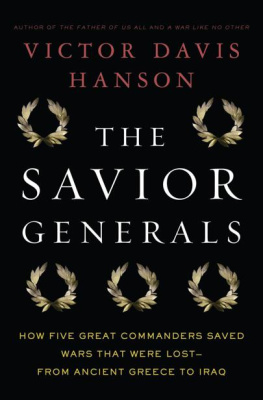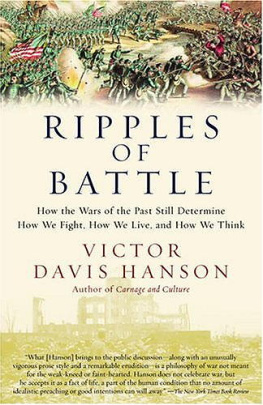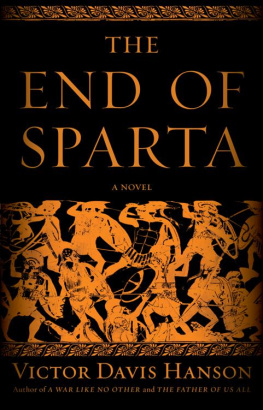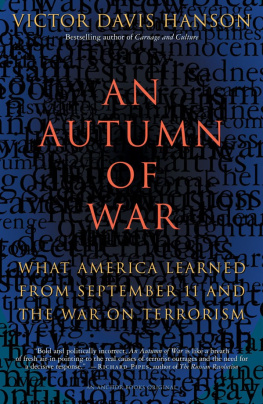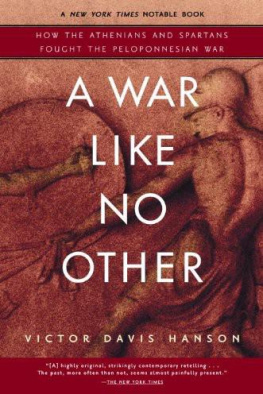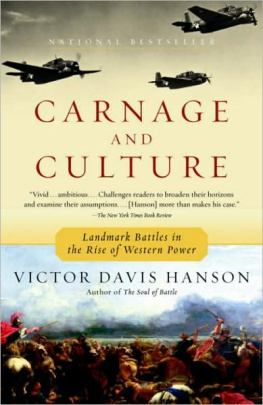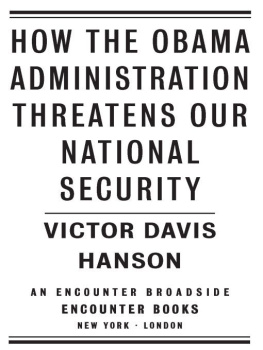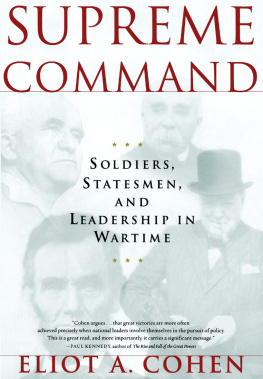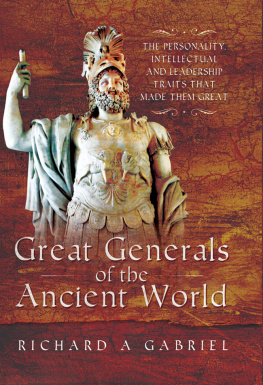
Contents
To Pauline, William, and Susannah
Servata fides cineri
What Wins Wars?
How are wars won or lost? Through sheer luck? Surprise? Morale? Material resources? Or does the outcome of conflict hinge on the advantages of superior manpower? Are more brilliant strategic planning and tactical protocol the keys to success? Then again, do armies win through lethal cutting-edge technologymore accurate bombs, deadlier shells, and longer-range missiles? And do all these criteria shift and turn and hinge on how we define waras conventional, asymmetrical, counterinsurgent, terrorist, or the like?
All these considerations in varying degrees have always determined military success. Hernn Cortss destruction of the Aztec Empire (151921) was predicated largely on possessing better arms. The vastly outnumbered but well-led Spanish conquistadors had access to harquebuses, artillery, steel swords, metal breastplates and helmets, horses, and crossbows, while the Aztecs did not. Spanish technological monopoly allowed a few hundred mounted knights to help enlist indigenous allies and end an empire of millions in roughly two years.
The industrial might of the United States often ensured that American forces in the distant Pacific during the Second World War simply had far more food, weapons, medical care, and military infrastructure than did the imperial Japanese in their own environs. Nazi Germanys Wehrmacht was usually outnumbered through much of 194445; nevertheless, its superior machine guns, artillery, and armor allowed spirited Germans to continue fighting when most other armies would have given up, in the face of terrible strategic decision making, supply shortages, an immoral cause, and superior enemy numbers.
Generals Still Matter
Yet on rare occasions, generals and the leadership of single individuals can still matter more than these seemingly larger inanimate forces. There are more than nine hundred admirals and generals in the U.S. military. They are not often considered to be in a position, under the protocols of postmodern conflict, to alter radically the course of battlefield actionespecially given the role of twenty-first-century technology. Yet among them are a few rare military geniuses and inspired leaders who, when the planets line up, can still, by their own genius or lack of it, themselves either win or lose wars. Winston Churchill was not altogether wrong when he said of Admiral John Jellicoes command of the British Grand Fleet in the First World War that he was the only man on either side who could lose the war in an afternoon.
So often we forget the power of individuals in the anonymous age of high technology and massive bureaucracies. Today, machines and regulations seem to lessen the influence of humans. They lull us into thinking that events transpire organically, almost without human agency. Yet frequently the fate of millions, both on the battlefield and to the rear, has always hinged on the abilities of just a few rare men of genius. In somewhat similar fashion, the emergence of corporations like Apple or Microsoft was predicated on the singularity of a Steve Jobs or a Bill Gates. The success of either company would be hard to envision without the genius of a single man.
Take away Hernn Corts, and for all their gunpowder and Spanish steel, the conquistadors would probably not have defeated the Aztecs when they did. The American Third Armys summer sprint across France seems unlikely without George Patton as its commander. The war in Europe might have been won without Patton at the head of the Third Army, but in a manner that would have been far more costly and lengthy. France had sufficient armor, artillery, and manpower to stop the German offensive through the Ardennes in May 1940; what the reeling French military tragically lacked was any sort of inspired or skilled leadership to translate its advantages into salvationin other words, a George Patton, Erwin Rommel, or Charles de Gaulle in charge of ground forces. Any German general other than Rommel would probably never have reached El Alamein; British generals other than Montgomery in late 1942 would probably never have pushed him back so decisively. Had a gifted American General Creighton Abrams commanded much earlier in Vietnam in 1965, and had an equally talented North Vietnamese General Giap never commanded Communist forces at all, the wardespite its myriad political, moral, cultural, and technological contoursmight have turned out quite differently.
For those historians who appreciate human agency, it is common to attribute such overarching powers of military leadership to historys great captains of the battlefield. The genius of an Alexander the Great, Julius Caesar, or Napoleon Bonaparte could decide the fate of thousands of soldiers on both sides of the battle line. Pity the Persian who lined up opposite Alexanders outnumbered troops at Gaugamela, or the Gaul who was besieged by Caesar at Alesia; had the former just faced a Parmenio or the latter a Pompey or Crassus, the overwhelming numbers of his kindred by his side might have saved him. Sometimes we grant such importance of command to sober and judicious organizers. Marcus Agrippa, Dwight D. Eisenhower, John J. Pershing, Alfred von Schlieffen, and Isoroku Yamamoto so mastered the planning of war and the mustering of forces at the general staff level that their insight and knowledge seemed to predetermine the course of upcoming battle. Even brilliant military bureaucrats at home such as George Marshall or Samuel Pepys on occasion ensured that forces at the distant front were likely to win battles before they started.
An industry of military history also exists to chart how and why some generals proved great, and most mediocre. Usually singular imagination, daring, charisma, speaking ability, instinct, calm, learning, physical robustness, relative youth, and an organizational mind are cited as the common gifts that, from Alexander to Napoleon, ensure success. Books on the untold secrets of the Great Generals appear each yearas do their antitheses, the aggregate lessons for modern leaders to be gleaned from the military disasters, errors, and follies of abject incompetents. We assume that there is an identifiable profile of both successful and disastrous military leadership across time and space. And such patterns can be studied, copied, and perhaps put to good use by those less naturally talented, from education to business. Rarely, however, do we read about saved, rather than won or lost, warsor generals who in extremis rescued rather than started or finished a war. Perhaps we neglect saviors who rescue unwise interventions better written off as over and quickly forgotten; or we feel that they are mere relief pitchers of sorts, who can only preserve, but not claim credit for, the eventual successful efforts begun by their worn-out predecessors.
Yet often the best generals do not plan wars or assume control on the eve of the first battle, when instead the better-connected marshals of the peacetime bureaucracy exercise high-profile command. Instead, the savior generals prove to be a subset of historys great captains. Such men emerge far later from the lower echelons when wars are almost lost. They arise only because their superiors are desperate and turn to the unlikely, to whom, in normal circumstances, they otherwise probably would not. These eleventh-hour landscapes of battle, when most at home and officers in the field have given up on a war as irrevocably stalemated or lost, draw in a different sort of commander. Prewar education, reputation, influence, and rank matter little when the enemy is gaining ground and very few know how to turn him back.
Next page
